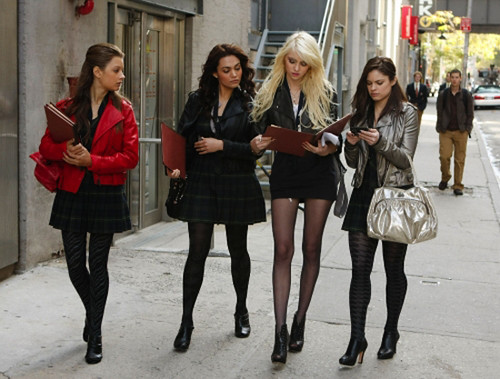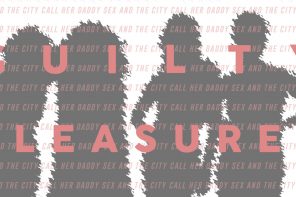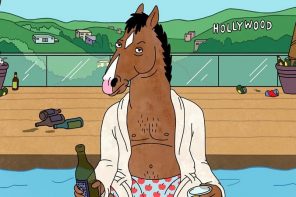Buried in the back of my closet lies a t-shirt that my friend and I each purchased as a memento of our middle school fixation on the scandalous teen drama Gossip Girl (2007–2012). The t-shirt features a still of Chuck Bass (Ed Westwick) and Blair Waldorf (Leighton Mester), the show’s main couple, reuniting in the second episode of the show’s fourth season following one of their many dramatic splits. Romance radiates in this scene as Blair, adorned in a gorgeous gown, finally locks eyes with Chuck under a dimly lit Parisian train station. Here, Chuck and Blair shippers’ hopes were rekindled with every phrase expressed by one character to the other, despite the fact that these declarations also unveiled the toxic nature of their relationship as a whole. Chuck specifically admits to having “destroyed” Blair, “the only thing [he] ever loved,” and while Blair acknowledges that “[her] world would be easier if [Chuck] didn’t come back,” she is adamant that she cannot live without him. The ambiguity of this interaction makes it difficult to pinpoint Chuck and Blair’s relationship status and fuels the “will they, won’t they” trope, which lured in young viewers, including myself, who are drawn to the thrill of this volatile romance. Yet, upon recently revisiting iconic teen dramas like Gossip Girl, The Vampire Diaries (2009-2017), and Pretty Little Liars (2010-2017), my perspective on their most infamous relationships has changed drastically. What had once been passionate depictions of love now reveal intricate layers of toxicity that eluded my younger self.
Although Chuck frequently disappears to avoid confronting his feelings, viewers have difficulty assessing the toxicity of this tactic because Chuck and Blair’s romanticized reunions always overshadow the suffering Blair previously endured.
Chuck and Blair envisioned their relationship as a competitive game in which they satisfied their mutually insatiable thirst for revenge, plotting to ruin the other’s life in the hopes of winning them over. As evidenced in the second season, when Chuck and Blair tortured one another with “three words, eight letters” (“I love you”), both protagonists believed that admitting their love meant submitting to the other person and declaring them the victor of their vicious game. For instance, Blair is left heartbroken when Chuck vanishes after she finally gives in to those three words. Although Chuck frequently disappears to avoid confronting his feelings, viewers have difficulty assessing the toxicity of this tactic because Chuck and Blair’s romanticized reunions always overshadow the suffering Blair previously endured.
Although Blair is portrayed to be cutthroat and self-assured, she repeatedly yields to Chuck’s tight grip on her heart. Chuck abuses his power over Blair by treating her like a commodity that he trades with his uncle to secure ownership of a hotel. Additionally, Chuck exerts forceful means when Blair reveals that she is engaged to another man. Chuck reacts by hurling Blair to the ground, insisting she is his, violently smashing a glass wall behind her, and only relinquishing his hold when she sobs and begs him to stop. Despite this inexcusable behavior, by the end of the series all is pardoned and the lovers marry; this sets a devastating precedent for young audiences who now equate love with pain, abuse, and sorrow.
This nurtures an early “I can change him” mentality, where relationships are seen as a turbulent journey that one must work hard at.
Gossip Girl affects the personalities and romantic desires of teens, guiding them toward harmful behaviors. Chuck captivated teenagers with his wealth, sensual voice, and mischievous grin to the point that murmurs echoed through the halls of my middle school of boys aspiring to emulate Chuck and girls yearning to have him. Chuck epitomized the “bad boy” trope that teen dramas frequently idealize. Within the first few episodes of Gossip Girl, Chuck sexually assaults two girls; however, this incident is ultimately forgotten as his relationship with Blair progresses and we are led to believe that she has transformed him. This nurtures an early “I can change him” mentality, where relationships are seen as a turbulent journey that one must work hard at. Specifically, individuals tend to downplay their partner’s alarming traits with the optimistic assumption that love or personal effort can fix them. However, this is a complex and often unrealistic expectation that could trigger a vicious cycle of frustration, disappointment, and emotional turmoil within the person assuming the “fixer” position.
In a similar vein, The Vampire Diaries’ Damon Salvatore (Ian Somerhalder) emulates this “bad boy” trope. He first emerges as a malicious vampire who maims people for his own indulgence, the complete antithesis of his compassionate brother Stefan (Paul Wesley). However, amidst a love triangle between the two brothers, the show’s protagonist, Elena Gilbert (Nina Dobrev), and its teen viewers are ultimately seduced by Damon. We become enamoured with the notion that love has uncovered a tender spot in Damon’s heart reserved only for Elena. Nevertheless, the slightest hint of turbulence in their relationship would unleash Damon’s malevolence, causing harm to all of Elena’s loved ones in a vengeful display. After Damon kills one of Elena’s friends, an argument erupts between the two in which they both admit that their relationship is toxic because of their control over one another, which triggers harmful acts. Still, because the scene culminates in a passionate kiss, this altercation is portrayed as the pinnacle of the characters’ all-consuming love. Although the show explicitly recognizes Damon and Elena’s toxicity, it also actively contributes to it by glorifying the splendor of their passionate but detrimental actions toward one another.
This support confirms that the couple was not portrayed inappropriately, but as romantic “star-crossed lovers,” even eliciting disdain from viewers toward Aria’s (rightfully) disapproving parents.
The despicable actions of these characters rarely appear to have repercussions. Pretty Little Liars epitomizes this when it pairs 16-year-old Aria Montgomery (Lucy Hale) with her teacher, Ezra Fitz (Ian Harding). Although the original novel leads to Ezra’s arrest, its TV adaptation presents him and Aria as endgame, fulfilling the desires of the teenagers that fervently shipped them. This support confirms that the couple was not portrayed inappropriately, but as romantic “star-crossed lovers,” even eliciting disdain from viewers toward Aria’s (rightfully) disapproving parents. The fact that the showrunners and actors rooted for Ezra and Aria epitomizes how their affair was strategically teased to entice young spectators.
The toxic yet passionate romances that these teen dramas have deftly built ensnare viewers in the captivating on-again, off-again relationships of their beloved characters. These tumultuous affairs are so compelling that you will root for these couples to reunite against all odds. While this experience is exhilarating, such distorted portrayals of love can be very detrimental to impressionable minds.








